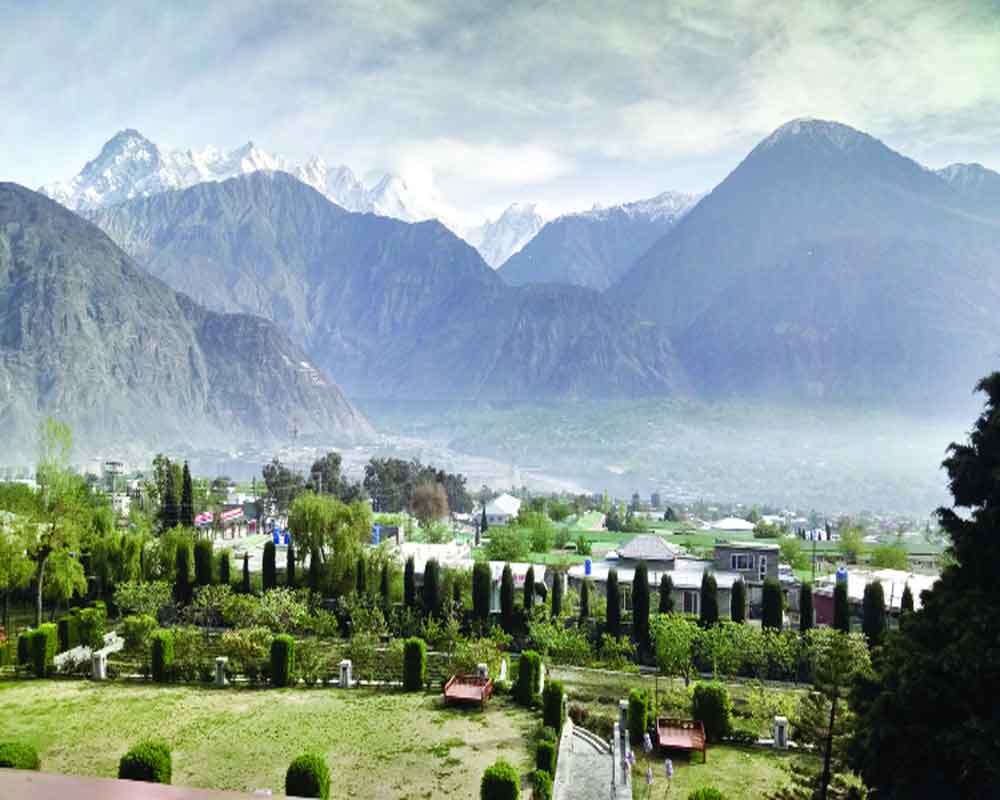Pakistan has coercively been occupying areas in Gilgit-Baltistan that belong to India since the princely State’s accession to India in 1947
India has rejected the “cosmetic exercise” of the recent elections in Pakistan-occupied Kashmir. Traditionally, the ruling party in Pakistan wins elections in PoK and the incumbent ruling party, Tehreek-e-Insaaf, won these elections. India lodged a strong protest with Pakistan last week, saying that such exercises can neither hide illegal occupation of the areas of the then princely State of Jammu and Kashmir by Pakistan, comprising about 35 per cent of its total area, nor the grave human rights violations, exploitation and denial of freedom to people in these occupied areas. India has called on Pakistan to vacate all the Indian areas under its illegal occupation since 1947, on which it has no locus standi. By virtue of accession of the ruler of the then princely State Maharaja Hari Singh to India in 1947, sovereignty of the whole erstwhile State lies wholly and solely with India.
The time appears to have come for Pakistan to introspect deeply and reflect on its illegal actions in these illegally occupied parts of now Union Territories of J&K and Ladakh. Steeped in abject poverty and backwardness, this illegally occupied area is still considered to be the most neglected area in South Asia. Despite violent protests by people at every stage, Pakistan has illegally, forcefully and through underhand means changed frontiers and composition of these areas beyond recognition. After illegally occupying the areas following an aggression on the then princely State, Pakistan established an administrative structure in the occupied area named as Azad Jammu and Kashmir Government. Even though with a nominal legislature, the Government there continues to be under strict control of Pakistan Government.
During the late 1970s, Pakistan started to take steps to bifurcate the subsequently extended occupied area in two parts, one it had already named as Azad J&K and the other as Northern Areas, comprising Gilgit-Baltistan, which it had deemed to be a separate geographical entity to be administered federally by Pakistan. The Northern Areas is mostly inhabited by Shia Muslims and Pakistan also initiated steps for demographic change in the area. This resulted in violent protests by the people. Even the so-called Azad J&K Government protested tooth and nail this bifurcation and also instituted a suit in its court. But so great was Pakistan’s urge to keep the fruits of aggression and to extend the borders of Pakistan illegally that it ignored all opposition and continued to resort to illegal means, including torture, to make it a federally administered area with nomenclature as Northern Areas.
Earlier too, in utter disregard for law and territorial integrity and sovereignty of India, Pakistan had ceded Shakasgam track territory in this illegally occupied Northern areas to China when Sino-Pak Frontier agreement was signed in 1963. It has also since annexed Chitral, Hunza and Nagar and other territories in or around Northern Areas including Punial, Ishkoman and Yasin which formed a part of the then princely State or were under its suzerainty at the time of its accession to India.
Pakistan again changed the status of Northern Areas on May 21, 2018, when it promulgated the Gilgit-Baltistan Order replacing its earlier ‘empowerment and self-government’ order of 2009. Under the new order, all powers exercised by Gilgit-Baltistan Council were given to the Assembly. But the Council was retained as advisory body for federal functions with regard to the Northern Areas. Thus legislative powers on key subjects are vested in the Prime Minister of Pakistan and not in the elected Assembly.
There were protests against this order not only in the area, but at many places in Pakistan. This reform package was seen as a precursor to attempts by Pakistan to make this area as its fifth province as also to change its demographic composition.
This perception was confirmed when last year Pakistan Prime Minister Imran Khan announced that the territory will be given provisional provincial status. Again in violation of international law and sovereignty of India and amid strong protests by people in PoK, Pakistan permitted China to run the China-Pakistan Economic Corridor project which passes through this Gilgit-Baltistan territory. Even the UN Economic and Social Commission for Asia Pacific in its report in May 2017 stated that the CPEC project could create geo-political tensions with India and lead to further instability in the region. Though reportedly prepared at the request of the Chinese Government, the report also pointed out concerns about its social and environmental safeguards. Provision of provisional provincial status to Northern Areas by Pakistan appears to be an attempt to lend legal cover to the much-criticised CPEC project which runs through Gilgit-Baltistan, an Indian territory.
India has already strongly protested against this yet another severe illegality of Pakistan. Last week, the Indian MEA rejected a reference to CPEC in a recent Pakistan-China joint statement. It said that the CPEC lies in Indian territory illegally occupied by Pakistan and that India resolutely opposes it. With regard to reference to J&K in the joint statement, the MEA spokesperson said that the UTs of J&K and Ladakh are an integral and inalienable part of India.
Obviously, if Pakistan still chooses to continue with its illegal actions and material changes in J&K and Ladakh under its illegal occupation, that will mean continued violation of sovereignty and territorial integrity of India. This will lead to more instability in the region. For overall development, India desires peace with Pakistan, but PakistanRs s action could lead to one more war over Jammu and Kashmir which could be far more dangerous.
(The writer is a journalist, former IIS officer and producer. The views expressed are personal.)


























